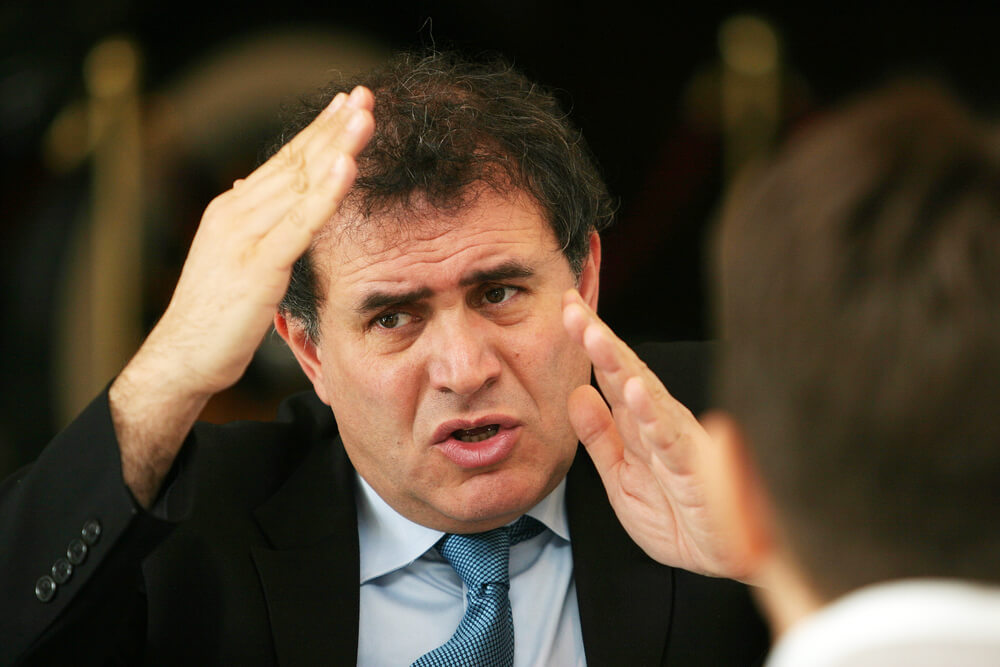New York University Stern School of Business professor and economist Nouriel Roubini warns against investors getting too “giddy” in their hopes of another market expansion because the “fundamental risks to growth remain, and are actually getting worse.”
Roubini, who has earned the nickname “Dr. Doom” for his pessimistic takes on Wall Street and the economy, says it wasn’t long ago that stock markets were rattled by an escalation in the trade war between the U.S. and China that sent bond yields to historic lows.
But now “the financial-market buzz has seized on the possibility of a ‘reflation trade,’ in the hope that the recent global slowdown will be followed in 2020 by accelerating growth and firmer inflation (which helps profits and risky assets),” Roubini wrote in his latest commentary on Project Syndicate.
Roubini attributes this shift to four developments:
- The U.S. and China are likely to reach a “phase-one” deal at some point.
- U.K. Prime Minister Boris Johnson seems to have a tentative “soft Brexit” deal with the EU.
- U.S. President Donald Trump has shown restraint despite provocations from Iran in the Middle East.
- Easing monetary policy by central banks like the Federal Reserve has provided a boost.
Because of this, Roubini argues, “even minor ‘green shoots’ — such as the stabilization of the US manufacturing sector and the resilience of services and consumption growth — have been taken as a harbinger of renewed global expansion.”
And even with all the positive developments, Roubini still sees slowdown in major economies like China, Germany and Japan, even if it is less severe.
He’s also wary of what any trade deal between China and the U.S. would actually mean, and warns that “the ongoing decoupling of the world’s two largest economies will almost certainly accelerate again after the US election next November.
“In the medium to long term, the best one can hope for is that the looming cold war will not turn hot.”
His outlook for Europe isn’t much better as “Germany and other countries with fiscal space continue to resist demands for stimulus.”
“Worse, the ECB’s new president, Christine Lagarde, will most likely be unable to provide much more in the way of monetary-policy stimulus, given that one-third of the ECB Governing Council already opposes the current round of easing,” Roubini continued.
Europe could also be hit at any moment by new auto tariffs that Trump has repeatedly threatened.
There are many factors threatening the Middle East’s economies, Roubini contends, including U.S. sanctions in Iran that have led to street riots while “massive protests have erupted in Iraq and Lebanon, a country that is effectively bankrupt and at risk of a currency, sovereign-debt, and banking crisis.”
Roubini also points to issues in Turkey, Syria, Yemen and Israel.
“The region is a powder keg; an explosion could trigger an oil shock and a renewed risk-off episode,” he warned.
And as far as central banks go, Roubini thinks they are running out of ways to combat a downturn because “fiscal policy remains constrained by politics and high debts.”
Roubini’s biggest worries are brewing in the medium-term. He says the “demographic aging in advanced economies and emerging markets will inevitably reduce potential growth, and restrictions on migration will make the problem worse.” And while technology will have some positive long-term benefits, the proliferation of “artificial intelligence and automation will first disrupt jobs, firms, and entire industries, exacerbating already high levels of inequality.”
He even tackles the debt issues nations around the world are facing in his laundry list of warnings.
“Whenever the next severe downturn occurs, high and rising private and public debts will prove unsustainable, triggering a wave of disorderly defaults and bankruptcies,” Roubini wrote.
All of this, he argues, is combining to create a “disconnect between financial markets and the real economy” that is growing.
“Investors are happily focusing on the attenuation of some short-term tail risks, and on central banks’ return to monetary-policy easing. But the fundamental risks to the global economy remain. In fact, from a medium-term perspective, they are actually getting worse.”
Click here to read Roubini’s column in full.
